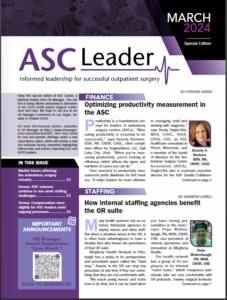
Triaging OR capacity amid COVID-19: Lessons from the field
Health systems nationwide are examining policies and procedures related to their resources, staffing, and scheduling to prepare for anticipated patient surges due to COVID-19. In late March, I talked with perioperative physicians and administrators from two health systems with rapid increases in COVID-positive cases, which have prompted significant changes in…
 Subscriber Content Developing a COVID-19 Recovery Plan for surgical services
Subscriber Content Developing a COVID-19 Recovery Plan for surgical services
When the coronavirus pandemic begins to subside, hospital leaders will be sorting out the repercussions and trying to resume normal operations. The main impact on ORs has been the widespread cancellation of non-essential procedures. Case cancellations in March and April have reduced elective procedure volumes as much as 90%. Most…
 Subscriber Content Best practices back proactive antimicrobial stewardship in ASCs
Subscriber Content Best practices back proactive antimicrobial stewardship in ASCs
Hospitals have long dominated the realms of infection control and antibiotic overuse. Ambulatory surgery centers (ASCs), which typically release patients the same day of a procedure, use antibiotics less frequently than other facilities, and most do not have an antimicrobial stewardship program. However, some ASC leaders and organizations are encouraging…
 Subscriber Content How prepared is your ASC to handle a surgical emergency?
Subscriber Content How prepared is your ASC to handle a surgical emergency?
Surgical errors and emergencies can happen at any time, at any facility. For ambulatory surgery centers (ASCs), a major challenge is finding official guidance on the topic. For the most part, it’s up to the individual facility to craft its own policies, competencies, and drills for OR emergencies. “The Association…
Can your hospital survive the growing dominance of ASCs?
Of the approximately 57 million surgical procedures performed annually in the US, it is estimated that hospital inpatient procedures (overnight admissions) account for less than 20% of cases. Many procedures once performed in hospital outpatient surgery departments (HOPDs) have moved to ambulatory surgery centers (ASCs) over the past 15 years,…
 Subscriber Content FCOTS increase through smarter scheduling and surgeon accountability
Subscriber Content FCOTS increase through smarter scheduling and surgeon accountability
Starting the first cases of the day on time is key for maintaining the OR schedule. A delay in first case on-time starts (FCOTS) can lead to less OR utilization, greater facility costs, and dissatisfaction among physicians, OR staff, and patients. It’s a problem in many surgical suites, but when…
To avoid penalties, know the rules for quality reporting
Keeping up with Medicare’s regulatory and reporting requirements for ambulatory surgery centers (ASCs) can be as difficult as ensuring physicians arrive to start their cases on time. “Regulations can change frequently,” says Gina Throneberry, MBA, RN, CASC, CNOR, director of education and clinical affairs for the Ambulatory Surgery Center Association…
 Subscriber Content A primer for starting a total joint replacement program
Subscriber Content A primer for starting a total joint replacement program
Ambulatory surgery centers (ASCs) have increasing incentives to offer total joint replacements (TJR) as Medicare expands the list of covered procedures. However, there’s a lot to consider in this particular service line. “There are many things to arrange that aren’t required with other service lines, particularly as home care of…
 Subscriber Content Are obese patients good candidates for the outpatient setting?
Subscriber Content Are obese patients good candidates for the outpatient setting?
Obesity rates and, consequently, obstructive sleep apnea (OSA) are on the rise in the US, and an increasing number of obese patients are undergoing surgical procedures at ambulatory surgery centers (ASCs). Healthcare providers at such facilities are adding procedures and taking steps to ensure the safety of patients whose body…
 Subscriber Content As ASC leaders' salaries dip, so does satisfaction
Subscriber Content As ASC leaders' salaries dip, so does satisfaction
Salaries for ambulatory surgery center (ASC) leaders are down slightly, according to the OR Manager 2019 Salary/Career Survey, with slightly more than half of respondents (52%) earning $100,000 or more—a decline from 60% in 2018, 54% in 2017, and 53% in 2016. That dip may be contributing to corresponding lower…


